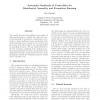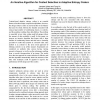ICRA
2002
IEEE
15 years 5 months ago
2002
IEEE
We consider the task of assembling a large number of self controlled parts (or robots) into copies of a prescribed assembly (or formation). In particular, we introduce a way to sy...
89
Voted
ICIP
2002
IEEE
15 years 5 months ago
2002
IEEE
Context-based adaptive entropy coding is an essential feature of modern image compression algorithms; however, the design of these coders is non-trivial due to the balance that mu...
102
Voted
ICDT
2003
ACM
15 years 6 months ago
2003
ACM
We consider the problem of evaluating a large number of XPath expressions on an XML stream. Our main contribution consists in showing that Deterministic Finite Automata (DFA) can b...
SC
2003
ACM
15 years 6 months ago
2003
ACM
We present GridSAT, a parallel and complete satisfiability solver designed to solve non-trivial SAT problem instances using a large number of widely distributed and heterogeneous...
114
Voted
MMAS
2004
Springer
15 years 6 months ago
2004
Springer
Future computing systems interact with a large number of users moving around buildings and streets. In this paper, we propose an example of such systems and how to evaluate ubicomp...
113
click to vote
ICANN
2005
Springer
15 years 6 months ago
2005
Springer
Although Support Vector Machines (SVMs) have been successfully applied to solve a large number of classification and regression problems, they suffer from the catastrophic forgetti...
FPL
2005
Springer
15 years 6 months ago
2005
Springer
SRAM-based FPGAs have an inherent capacity for defect tolerance. We propose a simple scheme that exploits this potential in multiple-FPGA systems. The symmetry of the system is ex...
113
click to vote
BIRTHDAY
2005
Springer
15 years 6 months ago
2005
Springer
The high cost of data consolidation is the key market inhibitor to the adoption of traditional information integration and data warehousing solutions. In this paper, we outline a n...
105
Voted
QSIC
2005
IEEE
15 years 6 months ago
2005
IEEE
This paper proposes a stochastic voting for testing a large number of Web Services (WS) under group testing. In the future, a large number of WS will be available and they need to...
98
Voted
ICNP
2005
IEEE
15 years 6 months ago
2005
IEEE
A mutually anonymous service hides the identity of a client from the service provider and vice-versa. Providing mutual anonymity usually requires a large number of participants. W...






